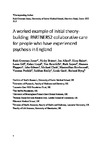A worked example of initial theorybuilding: PARTNERS2 collaborative care for people who have experienced psychosis in England

Date
2019-05-26Author
Subject
Metadata
Show full item recordAbstract
<jats:p> In this article, we present an exemplar of the initial theory-building phase of theory-driven evaluation for the PARTNERS2 project, a collaborative care intervention for people with experience of psychosis in England. Initial theory-building involved analysis of the literature, interviews with key leaders and focus groups with service users. The initial programme theory was developed from these sources in an iterative process between researchers and stakeholders (service users, practitioners, commissioners) involving four activities: articulation of 442 explanatory statements systematically developed using realist methods; debate and consensus; communication; and interrogation. We refute two criticisms of theory-driven evaluation of complex interventions. We demonstrate how the process of initial theory-building made a meaningful contribution to our complex intervention in five ways. Although time-consuming, it allowed us to develop an internally coherent and well-documented intervention. This study and the lessons learnt provide a detailed resource for other researchers wishing to build theory for theory-driven evaluation. </jats:p>
Collections
Publisher
Journal
Volume
Issue
Pagination
Recommended, similar items
The following license files are associated with this item:

